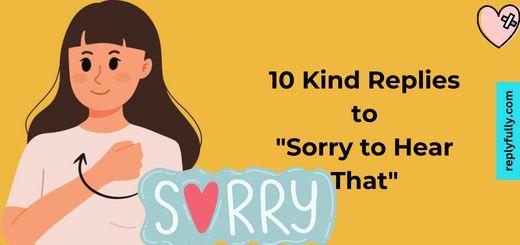When someone expresses sympathy with a heartfelt “Sorry to hear that,” it’s often in response to unfortunate news or a difficult situation you’re facing.
In crafting your response to “Sorry to hear that,” it’s essential to convey appreciation for the person’s empathy while also maintaining a positive and open dialogue. Acknowledging their kindness and sharing your feelings in a genuine manner can help strengthen your connection and foster a supportive relationship.
How to Reply to “Sorry to Hear That”
- Thank you for your kind words. It means a lot to have your support during this time.
- I appreciate your concern. It’s comforting to know that you’re thinking of me.
- Your empathy means a great deal to me. Thank you for being there.
- I’m grateful for your support during this challenging time. Your kindness means a lot.
- Thank you for your compassion. It’s comforting to have friends like you by my side.
- Thank you for your caring words. It’s comforting to have your support during tough times.
- I’m touched by your kindness. Knowing you’re there means a lot to me.
- Your sympathy is deeply appreciated. It helps lighten the burden during challenging moments.
- I’m grateful for your thoughtfulness. Your support is a source of strength for me.
- Thank you for your empathy. It means a great deal to have friends like you by my side.
Explanations:
1. Thank you for your kind words. It means a lot to have your support during this time.
✅ Family, friend, coworker
This response expresses gratitude for the person’s sympathy and acknowledges the value of their support.
Example:
Friend: “I heard about your loss. Sorry to hear that.”
You: “Thank you for your kind words. It means a lot to have your support during this time.”
2. I appreciate your concern. It’s comforting to know that you’re thinking of me.
✅ Family, friend, coworker
This response acknowledges the person’s empathy and conveys appreciation for their concern.
Example:
Coworker: “I heard about the difficulties you’re facing. Sorry to hear that.”
You: “I appreciate your concern. It’s comforting to know that you’re thinking of me.”
3. Your empathy means a great deal to me. Thank you for being there.
✅ Family, friend, coworker
This response highlights the value of the person’s empathy and expresses gratitude for their presence.
Example:
Family member: “I heard about what happened. Sorry to hear that.”
You: “Your empathy means a great deal to me. Thank you for being there.”
4. I’m grateful for your support during this challenging time. Your kindness means a lot.
✅ Family, friend, coworker
This response acknowledges the person’s support and expresses gratitude for their kindness.
Example:
Friend: “I heard about your struggles. Sorry to hear that.”
You: “I’m grateful for your support during this challenging time. Your kindness means a lot.”
5. Thank you for your compassion. It’s comforting to have friends like you by my side.
✅ Family, friend, coworker
This response expresses appreciation for the person’s compassion and emphasizes the importance of their friendship.
Example:
Coworker: “I heard about what happened. Sorry to hear that.”
You: “Thank you for your compassion. It’s comforting to have friends like you by my side.”
6. Thank you for your caring words. It’s comforting to have your support during tough times.
✅ Family, friend, coworker
This response expresses gratitude for the person’s sympathy and acknowledges the value of their support during difficult times.
Example:
Friend: “I heard about your setback. Sorry to hear that.”
You: “Thank you for your caring words. It’s comforting to have your support during tough times.”
7. I’m touched by your kindness. Knowing you’re there means a lot to me.
✅ Family, friend, coworker
This response acknowledges the person’s empathy and conveys gratitude for their presence and support.
Example:
Coworker: “I heard about what happened. Sorry to hear that.”
You: “I’m touched by your kindness. Knowing you’re there means a lot to me.”
8. Your sympathy is deeply appreciated. It helps lighten the burden during challenging moments.
✅ Family, friend, coworker
This response highlights the value of the person’s sympathy and expresses gratitude for their understanding and support.
Example:
Family member: “I heard about your loss. Sorry to hear that.”
You: “Your sympathy is deeply appreciated. It helps lighten the burden during challenging moments.”
9. I’m grateful for your thoughtfulness. Your support is a source of strength for me.
✅ Family, friend, coworker
This response acknowledges the person’s thoughtfulness and expresses gratitude for their supportive presence.
Example:
Friend: “I heard about your struggles. Sorry to hear that.”
You: “I’m grateful for your thoughtfulness. Your support is a source of strength for me.”
10. Thank you for your empathy. It means a great deal to have friends like you by my side.
✅ Family, friend, coworker
This response expresses appreciation for the person’s empathy and emphasizes the importance of their friendship and support.
Example:
Coworker: “I heard about what happened. Sorry to hear that.”
You: “Thank you for your empathy. It means a great deal to have friends like you by my side.”
Conclusion
Next time someone offers their condolences with “Sorry to hear that,” try using one of these responses to express your gratitude and strengthen your connection with them. Remember, genuine appreciation goes a long way in building meaningful relationships.

